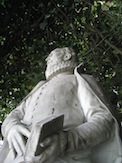Philippe de Marnix de Sainte Aldegonde (1540-1598) was born and grew up in Brussels. His father came from Savoie, his mother from near Mons. He studied in Louvain, Paris, Padova, Dole and Genève, where he registered as one of Calvin’s first students. He subsequently became the chief adviser of Wilhelm von Nassau, Prince of Orange, Brussels’ leading aristocrat and leader of the revolt against Spanish domination, concocted on his behalf the first official document recognizing some form of freedom of religion (the Pacification of Ghent, 1576) and is believed to be the author of is still now the Dutch national anthem (the Wilhelmus). Shortly before his assassination, Nassau put Marnix in charge of the defence of Antwerp as its buitenburgemeester. In this capacity, he negotiated with Alessandro Farnese the surrender of Antwerp (1585), which proved decisive for a definitive separation between the provinces that have now become the Netherlands and Belgium. He subsequently moved to Zeeland, where he translated part of the Bible from Greek and Hebrew into Dutch.
According to Paolo Rinaldi, a collaborator of Alessandro Farnese who met him in Beveren at the time of the negotiations on Antwerp, Marnix was “a noble, wise, clever, sagacious, eloquent, experienced gentleman, well versed in Greek, Hebrew, Latin ; he understands and writes easily in the Spanish, Italian, German, French, Flemish, English languages and many others, better than any other man from those countries”. Among his letters that were preserved, over half are in French, 30% in Latin, 10% in Dutch, and the rest in Italian, German, Spanish and English. (See Rudolf De Smet, “Taal, context en conventie in Marnix’ correspondentie”, in : H. Duits & T. Van Strien eds., Een intellectuele activist. Studies over leven en werk van Philips van Marnix van Sint Aldegonde, Hilversum, 2001, pp. 37-50).
